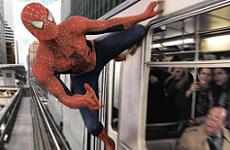
 |
| Photo © 2004 Sony Entertainment/Columbia Pictures |
| Academy Award Nominations and Winners: | |
| Best Sound: Kevin O'Connell, Greg P. Russell, Jeffrey J. Haboush, and Joseph Geisinger | |
| Best Sound Effects Editing: Paul N.J. Ottosson | |
| ★ | Best Visual Effects: John Dykstra, Scott Stokdyk, Anthony LaMolinara, and John Frazier |
| Permalink | Home | 2004 | ABC | Blog |